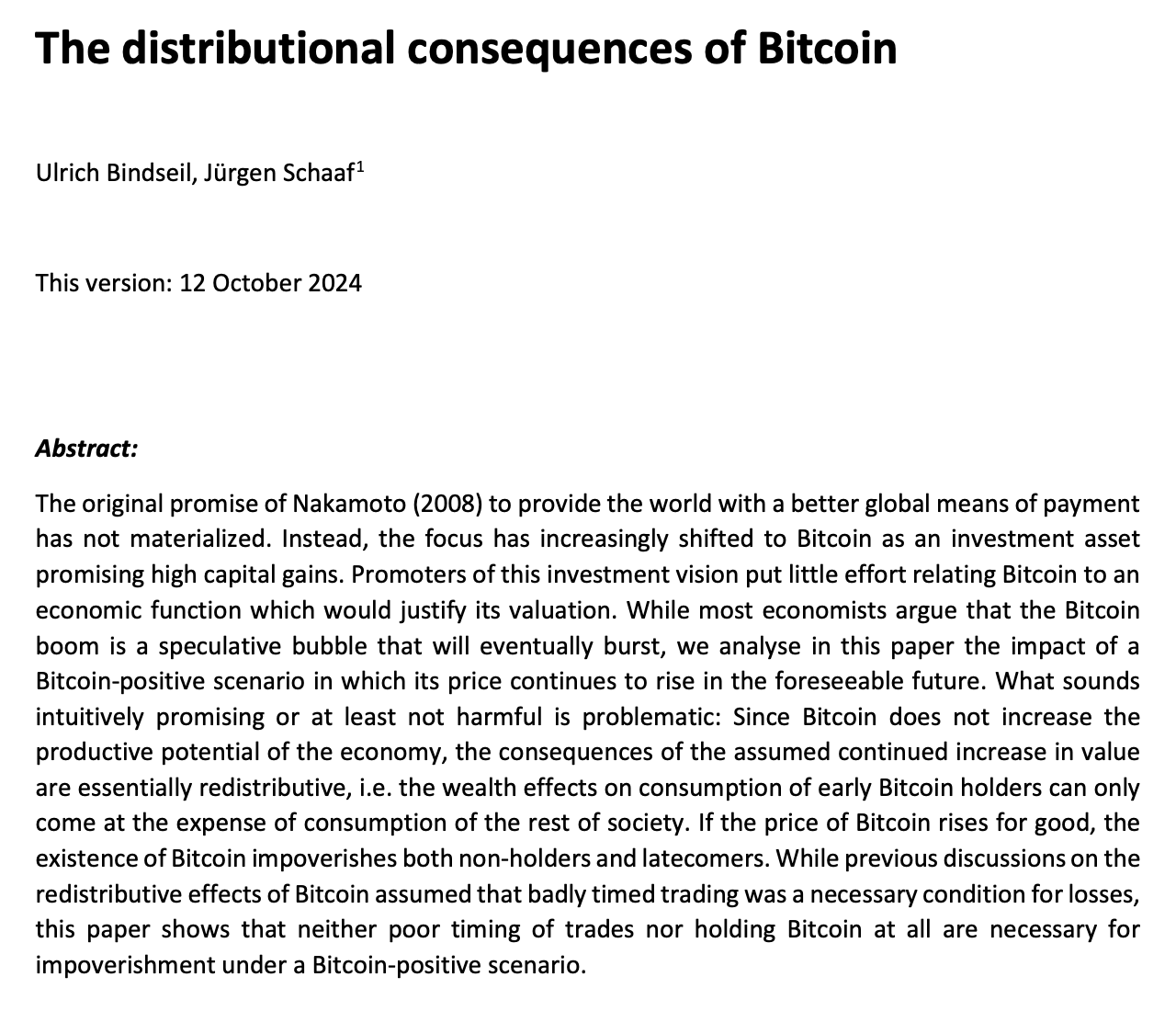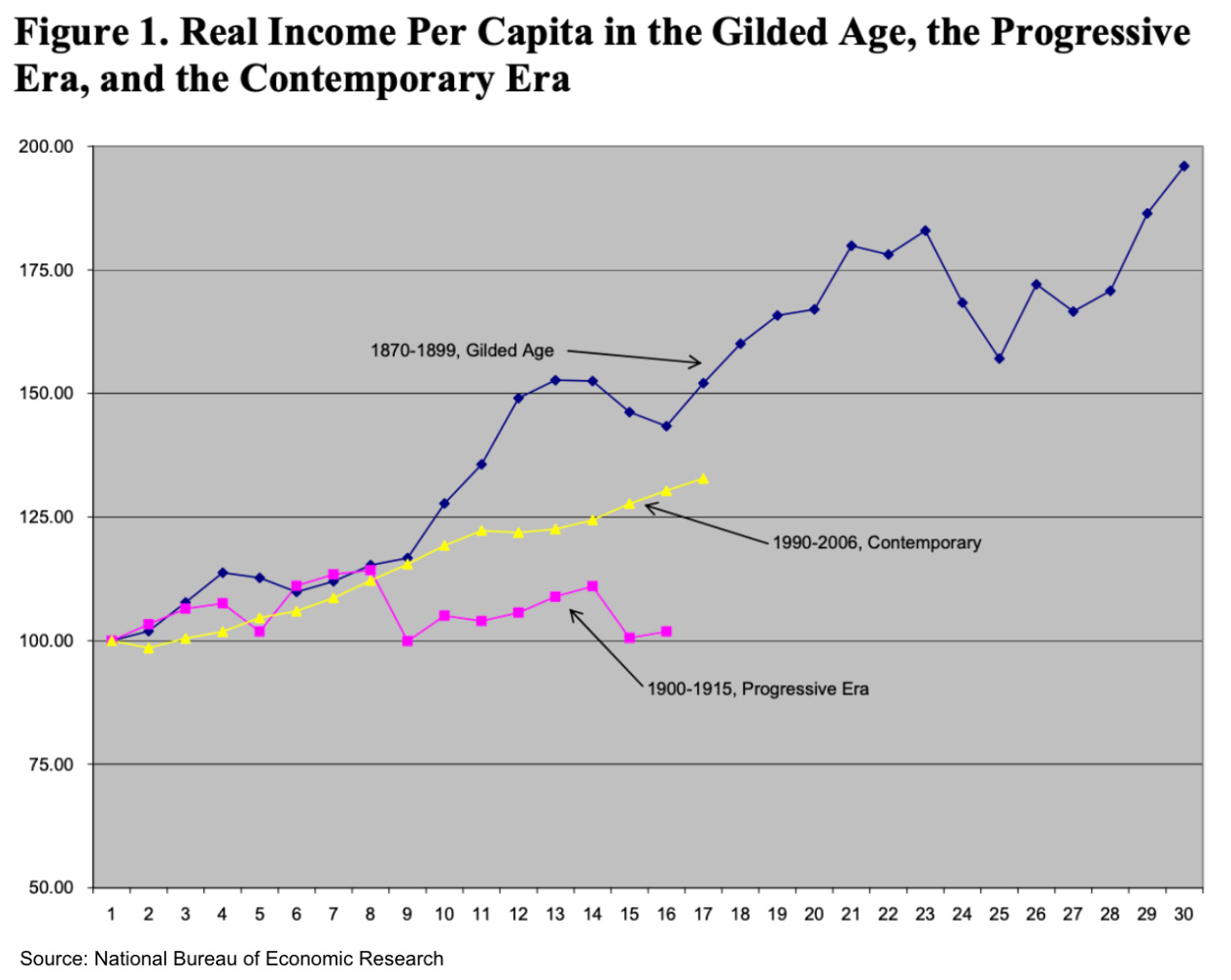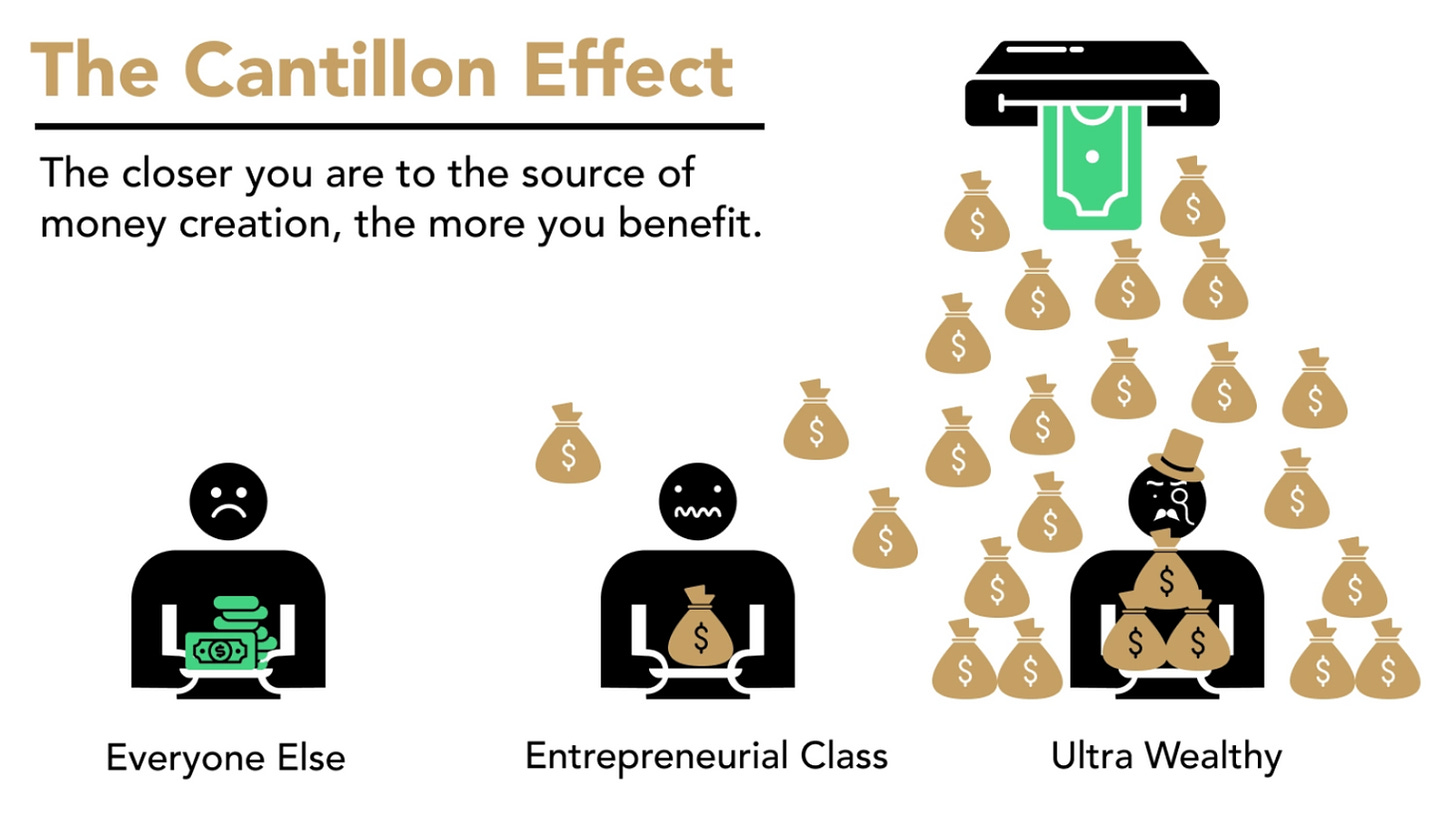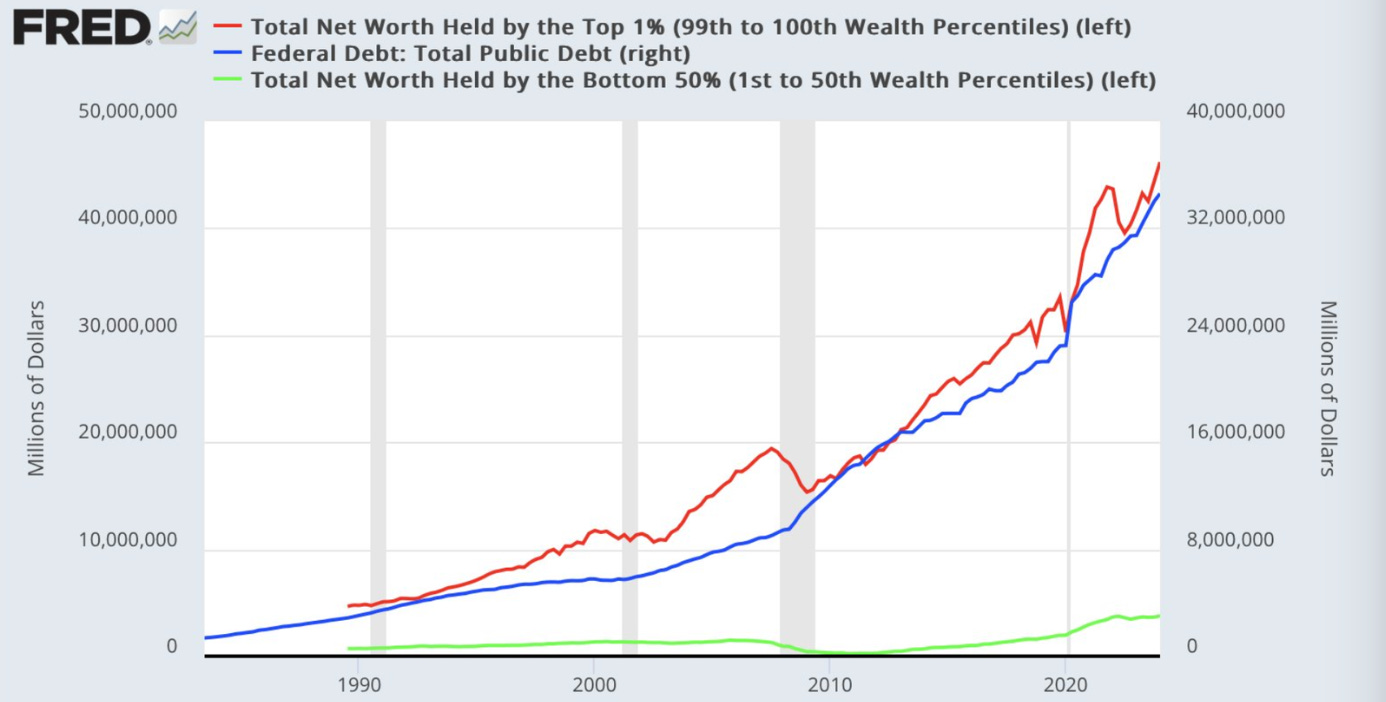Central Banks Attack Early Bitcoin Adopters - What They Got Wrong (and Right)
News Block #59 (10/24/2024)
Listen to the latest episode of the News Block below. 👇
ECB Officials Publish Anti-Bitcoin Paper
Sometimes, a piece of FUD catches the entire Bitcoin community’s attention because it’s so disingenuous. This week, a working paper from two European Central Bank (ECB) officials did just that.
The paper claims that Bitcoin is bad for society, regardless of whether its price rises or falls.
The authors argue that Bitcoin's early adopters will impoverish non-holders as its price rises, leading to instability, inflation, and societal division, even threatening democracy itself. They go as far as recommending that non-holders advocate for legislation to prevent Bitcoin's price from increasing or to make it disappear altogether.
It’s easy to see why this hit a nerve with so many Bitcoiners. Not only does it call for Bitcoin’s demise, but it’s also filled with misconceptions and hypocrisy. But let’s zoom out and remember these arguments are coming from central bankers.
As they continue to debase their currencies, central banks will likely use every tool at their disposal to discredit Bitcoin. However, we can work to discredit these central bankers by refuting their claims one by one.
1.) Bitcoin is Saving and Savings Drive Economic Growth
One of the paper’s central flaws is its claim that Bitcoin doesn’t increase the economy's productive potential—that it’s simply a speculative investment detached from real-world utility. This fundamentally misunderstands not only Bitcoin but also the role that sound money plays in fostering long-term, sustainable growth.
Saving is critical for driving economic productivity.
When individuals and businesses can save money that holds its value over time, they’re not just preserving wealth—they’re creating the foundation for future investment.
It enables people to invest in new technologies, start businesses, and expand infrastructure, all of which are essential for increasing productivity and innovation. However, when fiat currencies, like the euro, are constantly devalued by inflationary monetary policies, it becomes nearly impossible for everyday people to save.
This undermines their ability to build wealth and stifles the capital needed for long-term investments. When savings are eroded by inflation, people are forced to invest in riskier assets just to preserve their purchasing power. In the fiat world, you have to work to make the money and then work more to preserve it after you’ve earned it.
History has proven that sound money leads to capital formation, which in turn drives innovation and economic expansion. If we look back to the gold standard era of the late 19th and early 20th centuries, we can see how sound money contributed to a wave of unprecedented innovation and productivity, which raised the living standards at a rapid rate.
The chart below highlights how real income per capita—a proxy for living standards— exploded upwards while we lived under a sound money regime.
During the Gold Standard era, the economy thrived, and many world-changing technologies were invented, including the automobile, the internal combustion engine, the telephone, and even the airplane.
These innovations didn’t come from speculation; they were the result of societies being able to save and invest confidently in new ventures because their money wasn’t being devalued.
In short, Bitcoin doesn’t just increase wealth for early adopters—it can increase the productive potential of the entire economy by fostering an environment where saving and long-term investment are encouraged, not punished.
Unlike fiat currencies that central banks continuously debase, Bitcoin’s fixed supply of 21 million makes it the most reliable form of long-term savings ever created. Its value isn’t manipulated by central banks or eroded by inflation. People can store their wealth in Bitcoin with the confidence that its purchasing power will be preserved, which incentivizes saving and investment.
The paper's authors miss this point entirely, failing to understand that Bitcoin's stability as sound money is exactly what enables it to contribute to long-term productivity and innovation.
Bitcoin Represents the Antithesis of the Cantillon Effect
Another problem with this paper’s argument is it criticizes Bitcoin for wealth redistribution, but let’s be clear: the real drivers of wealth inequality in the last couple of decades have been central banks themselves.
Through policies such as Quantitative Easing (QE), ultra-low interest rates, and money printing, central bank policies have disproportionately benefited the wealthy while leaving the middle and lower classes behind. These policies artificially inflate the value of assets like real estate, stocks, and bonds—assets that are predominantly held by the wealthy—causing a widening wealth gap.
This dynamic is known as the Cantillon Effect, where those closest to the newly created money benefit the most. The privileged elite, which includes massive corporations, special interest groups, and the wealthy, receive freshly printed money first, often at favorable interest rates, and can invest it into assets before prices rise.
By the time the broader population feels the effects of QE or new money creation, inflation has already eroded their purchasing power, leaving them with higher living costs and stagnant wages.
Prominent voices have called out central bank policies for driving inequality. Stanley Druckenmiller said, “The biggest accelerant of wealth disparity has been QE.” Former Senior Fed Economist Dr. Lacy Hunt added, "QE exacerbated the income and wealth divide.” Investor Kiril Sokoloff put it bluntly: "QE was socialism for the 1%."
The asset price inflation caused by central bank policies has made housing unaffordable for many and inflated stock prices to historic valuations. In this system, those with assets grow exponentially wealthier while those dependent on wages struggle to get by. This is evident when looking at the divergence in net worth between the top 1% and bottom 50%, particularly since the Global Financial Crisis.
Also, the 2008 bank bailouts showed us that if things go south, the system can be manipulated at any moment to keep the privileged protected and bailed out by the taxpayers.
Bitcoin stands in stark contrast to this system. Its rules are transparent, fixed, and voluntary. Unlike fiat money, Bitcoin cannot be printed or manipulated by central authorities to bail out the wealthy or to fuel asset bubbles.
Unlike fiat currency, which benefits those with insider access, Bitcoin’s system is open to everyone. There are no central banks to manipulate the supply, no political interests controlling the currency, and no Cantillon Effect rewarding those closest to the monetary printers.
Bitcoin’s open, decentralized nature levels the playing field. Anyone, anywhere, can buy and hold Bitcoin without needing the privilege or access typically reserved for institutional investors in traditional finance.
The authors claim that Bitcoin could create instability and division in our society when not realizing that this is EXACTLY what is plaguing our world today under fiat.
So, instead of calling Bitcoin unjust, perhaps these central bankers should take a long, hard look in the mirror and consider the consequences of the system that they help perpetuate.
Bitcoin is Voluntary; Fiat is Exploitive
The last claim I’ll address here from the paper is that Bitcoin is somehow unjust because too much wealth has been accumulated by early adopters. But this is just how all early game-changing technologies and profitable investments emerge.
Look at the computer or telephone. Early adopters and businesses benefited from adopting these technologies before others.
And how about early investors in Amazon or Apple—they reaped huge rewards because they saw their potential early. Does this mean they extracted those gains from later buyers of the stock? Absolutely not. That would be a ridiculous statement. And it would be ridiculous to think all early investors of the Magnificent Seven should redistribute their wealth or have a 75% capital gains tax on it.
The paper paints Bitcoin as exploitative, suggesting that early adopters benefit at the expense of latecomers. However, this is a voluntary system—anyone can opt-in at any time, and anyone could have opted in at any time since 2009.
Bitcoin’s success isn’t about exploitation; it’s about offering an alternative to the broken fiat system.
The real reason Bitcoin continues to rise is because people are losing faith in fiat currencies. Central banks like the ECB have mismanaged monetary policy, creating massive debts and devaluing their currencies. People need an escape from this broken system, and Bitcoin provides that alternative.
Bitcoin is not impoverishing people. Fiat is.
In the end, holders of worse money will lose out to holders of better money. In economics, this is known as Thier’s Law. Good money will chase out the bad money.
As Saifedean Ammous says, “History shows it is not possible to insulate yourself from the consequences of others holding money that is harder than yours.”
I agree with one takeaway from the paper: if you don’t adopt Bitcoin, you will fall behind those who do. This has already been happening over the last several years. As life has been getting cheaper for Bitcoin holders, life has been growing more expensive for fiat holders.
Bitcoin is sound money that increases productivity, fosters long-term investment, and offers people a way to protect their wealth from debasement.
As much as these authors would like it to be the case, it’s not Bitcoin’s fault that these institutions destroyed their currencies. Bitcoin is not the problem; it’s the solution.
Fortunately, anyone can opt into Bitcoin to preserve their wealth. All one has to ask themselves is: “Do I want to see my fiat savings erode over time, or my Bitcoin savings grow?”
Ultimately, it’s everyone’s choice, and we all get Bitcoin at the price we deserve.
Until next week, keep stacking.
- Sam & Nat
If you enjoyed reading this post, you should consider subscribing to the News Block.
The News Block is powered by Bitdeer Technologies Group, a publicly-traded leader in Bitcoin mining that stands alone as the only vertically-integrated, technology-focused Bitcoin mining company.
NEW: Alex Gladstein: Bitcoin as a Force for Change – Untold Stories of Human Rights and Energy Innovation
In this episode with Alex Gladstein of the Human Rights Foundation, we discuss:
Untold human rights stories around the world
Why NOT mining Bitcoin is a waste of energy
Will the election impact Bitcoin adoption?
Are we in price discovery and a new Bitcoin bull market?
Bitcoin as a tool of hope
Make sure to listen to my latest Coin Stories episodes, featuring Alex Leishman, Matthew Lysiak, Larry Lepard & James Lavish.
Listen on Fountain and Earn Bitcoin: Click here
Listen on Apple Podcasts: Click here
Listen on Spotify: Click here
Listen on YouTube: Click here
Coin Stories Promotional Links and Discounts
Casa - Secure your Bitcoin with multi-sig collaborative custody and set up your inheritance plan today. Get 10% off your plans by using my link.
Speed Wallet - For easy, low-cost, instant Bitcoin payments, we use Speed Lightning Wallet. Download it using this link, and Get 5000 sats when you use the promo code COINSTORIES10.
River is where we DCA weekly and buy Bitcoin with the lowest fees in the industry.
CoinKite - Your go-to tech company for top-notch Bitcoin self-custody solutions, including the popular ColdCard wallet. Get 5% off using my link.
The Bitcoin Way - Master Bitcoin Self-Custody and gain peace of mind with the help of The Bitcoin Way - your 1-on-1 support for Bitcoin custody and privacy!
Efani - Protect yourself from SIM swaps that can hack your accounts and steal your Bitcoin. Join America’s most secure mobile service, trusted by CEOs, VIPs, and top corporations.
Bitcoin 2025 - Bitcoin 2025 is heading to Las Vegas on May 27-29th! Join Natalie for her 4th Annual Women of Bitcoin Brunch! Get 10% off Early Bird passes using the code HODL.
Orange Pill App - Connect with Bitcoiners and Bitcoin merchants wherever you live and travel on the Orange Pill App.











ECB writing a hit piece about Bitcoin is like the Italian Mob in NYC being upset about a neighbourhood run numbers racket that wasn’t fixed and managed by the community to have some fun and redistribute a few bucks to a weekly lucky person. Gangsters NEVER want competition.